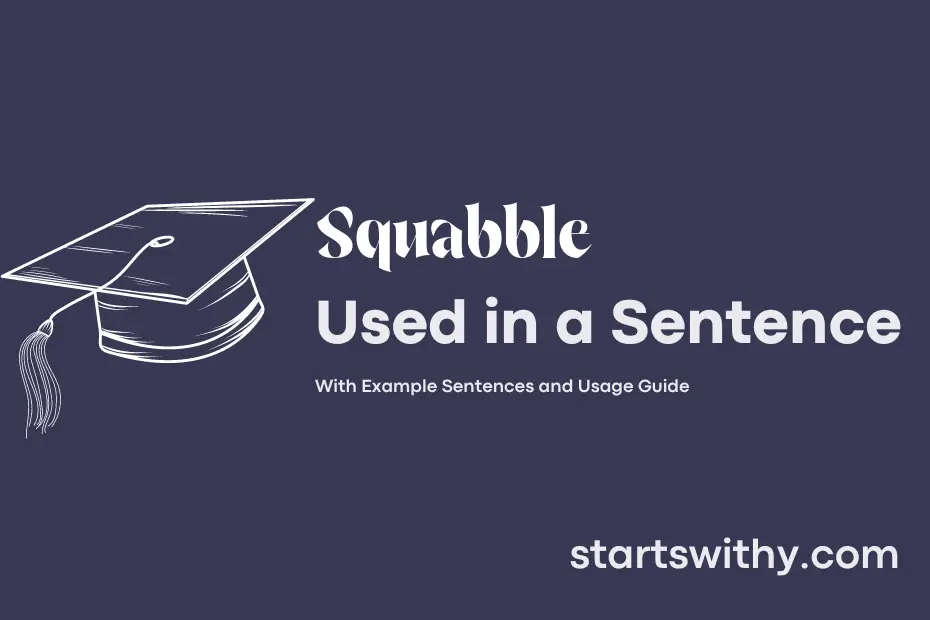Have you ever found yourself in a squabble, a minor argument or disagreement that seems to have no end in sight? Squabbles are common in everyday life, often arising from misunderstandings or differing opinions on various matters.
A squabble can occur between friends, family members, coworkers, or even strangers, and it can range from a simple bickering match to a full-blown conflict. Despite their often trivial nature, squabbles can escalate quickly if not resolved effectively, causing stress and strain on relationships.
7 Examples Of Squabble Used In a Sentence For Kids
- Don’t squabble over toys, share nicely with your friends.
- Let’s not squabble about who goes first, take turns instead.
- It’s not nice to squabble with your classmates, be kind to each other.
- We can solve a squabble by talking calmly and listening to each other.
- Remember to use your words when you squabble, hitting is not the answer.
- If you feel a squabble coming on, take a deep breath and count to three.
- Let’s work together to find a solution and end the squabble peacefully.
14 Sentences with Squabble Examples
- During group projects, squabbles often arise over conflicting ideas and opinions.
- Roommates can get into squabbles over things like cleanliness and sharing personal items.
- Squabbles between friends about who owes whom money after a night out can strain relationships.
- There may be squabbles over the best time to study in shared spaces like libraries or cafes.
- Squabbles about study group schedules can cause tension among members.
- Student organizations may have squabbles over budget allocations for events and activities.
- Squabbles between students about plagiarism and cheating accusations can lead to serious consequences.
- Squabbles can occur over who gets to use the common room for social gatherings or study sessions.
- Student athletes might have squabbles over playing time and positions on sports teams.
- Squabbles between classmates about exam grades and curves are not uncommon.
- There could be squabbles between roommates about noise levels, especially during exam season.
- Students may find themselves in squabbles over study room reservations in the library.
- Student government members may have squabbles over policies and decisions affecting the student body.
- Squabbles over internship opportunities and networking resources can be fierce among college students.
How To Use Squabble in Sentences?
Squabble is used to describe a minor disagreement or argument between people. When using the word Squabble in a sentence, it is important to keep in mind its meaning and context. Here is a helpful guide on how to use Squabble effectively:
-
Identify the situation: Before using Squabble in a sentence, pinpoint a scenario where a small dispute or disagreement is taking place among individuals.
-
Choose the subject: Determine who or what is involved in the Squabble. This could be two individuals, a group of people, or even animals.
-
Frame the sentence: Construct a sentence that captures the essence of the Squabble. For example, “The siblings had a silly squabble over who gets to sit in the front seat of the car.”
-
Provide context: Offer details or background information to help clarify the Squabble. This could include reasons for the disagreement or any emotions involved.
-
Consider tone: Depending on the tone you want to convey, adjust your sentence to reflect the seriousness or lightheartedness of the argument. For instance, “The neighbors had a playful squabble about whose lawn looked the best.”
-
Reiterate the meaning: Ensure that the sentence accurately portrays a minor disagreement or argument by using Squabble appropriately.
By following these guidelines, you can effectively incorporate Squabble into your vocabulary and communicate minor conflicts in a clear and concise manner.
Conclusion
In summary, squabble refers to a petty argument or disagreement often viewed as trivial in nature. The example sentences in this article demonstrate how squabble is commonly used to describe minor disputes or conflicts between individuals or groups. These sentences highlight the simplicity and commonality of squabbles in everyday interactions, emphasizing their fleeting and inconsequential nature.
Through these examples, we see how squabble encapsulates the notion of bickering over small matters or differences of opinion. Despite the potential for tensions to arise from squabbles, they are generally resolved quickly and do not typically have a lasting impact on relationships. By understanding the context in which squabble is used, we can appreciate its role in depicting minor altercations and recognize the common occurrence of such disputes in various settings.



